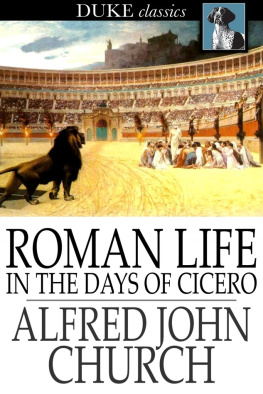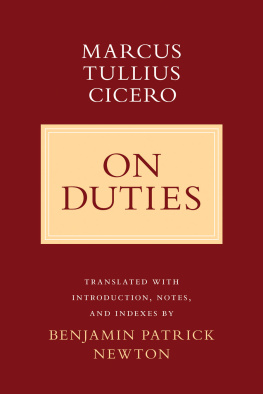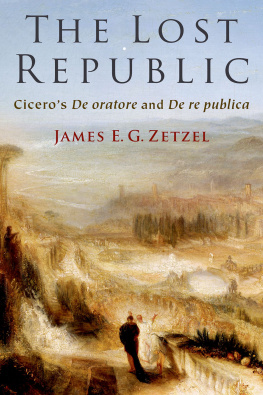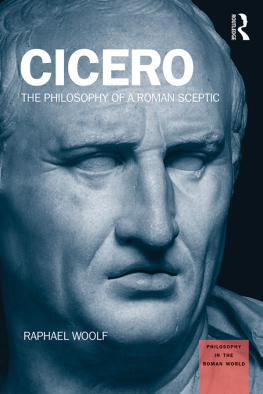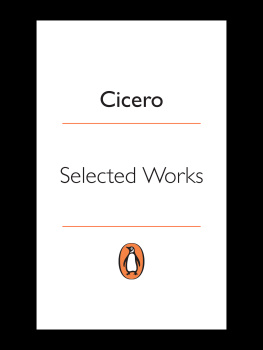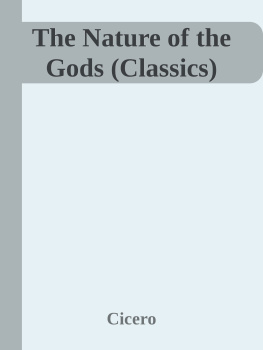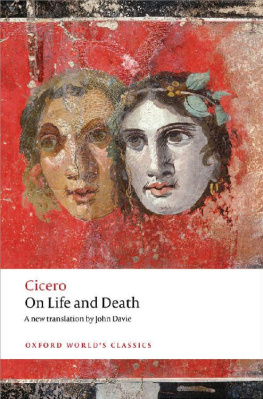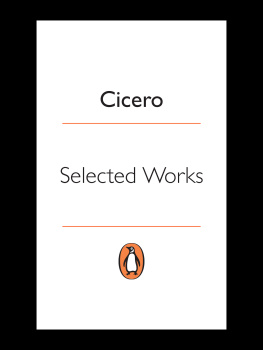Preface
Disserens in utramque partem tum Graece tum Latine et abduco parum per animum a molestiis etdelibero (ad Atticum).
The ages pass, and so do trends and interpretative parameters. The reason why classics of literature and philosophy remain classics is above all because they can influence the way new parameters arise.
So it is for Cicero. The Cicero we know today is certainly not the same of the nineteenth century, nor of the twentieth, nor the Cicero of western Humanism. We cannot say which one is the true Cicero, because the paths of criticism are linked not only to the manuscripts and testimonies we possess (which are less reliable or consistent than we might think), but also to the changing nature of the contexts in which he is studied, to the analytical tools available and to the specific training of individual scholars. In the case of Cicero, we are faced with an exceptional protagonist, fully involved in the historical and political events of his time, and also gifted with an extreme competence in the art of rhetoric. This ability allowed him both to organize in an effective and peculiar way the diffusion of his thought and to control the transmission of his own image and the moulding of his personality in the eyes of his contemporaries and, even, in ours. In this regard, the importance of the Ciceronian correspondence is undeniable.
Alongside Cicero the orator, the politician, the rhetorician, the man of letters and the lover of the Roman and Greek tradition, recently the philosopher Cicero has also emerged: an aspect of Ciceros that has been neglected, especially in the Romantic age. The legitimacy of this designation depends on the meaning that we give to philosopher. In the Greek world, and also in the philosophical thought of recent centuries, the philosopher has often been identified with the theoretician; in other ages, the philosopher coincided with the scientist, and sometimes with the logician or the moralist. Someone previously considered a philosopher may very well today be excluded from the canon of philosophers; so too we can also find unexpected appearances in modern published Companions of philosophy.
From the point of view of moral consistency and political choices, Ciceros image is likely to remain damaged. But that does not matter. The Cicero I am dealing with here is above all a man of high culture; a scholar who discussed a number of philosophical-theoretical issues with scholars and masters belonging to different philosophical schools; a tireless protagonist of the political scene who tried to combine the time of action with the time of thinking; a passionate and enlightened investigator of the Roman tradition willing to confront without awe the Greek culture, whose revolutionary power he recognized.
I am especially interested in showing that we are not dealing with a mere populariser; I am convinced that if, thanks to Ciceros philosophical work, we are able to reconstruct the history of the Academy in the Hellenistic era, we cannot for this reason renounce defining his personality and his purpose as a philosopher.
Following the aim of Key Perspectives on Classical Research, this volume focuses on relevant studies pursued in the last decades. For contingent reasons, I have favoured scholarship in English, without neglecting, though, the most significant works published in other European languages and not yet translated into English, with the awareness that they are the result of different cultural climates and schools: precisely for this reason they are a source of original suggestions and unexpected entries. Starting from these premises, I have explored and discussed the trends of scholarship on Ciceros philosophy, showing that a positive reconsideration of it has been achieved. On several occasions we will observe that the most recent studies have deepened specific or collateral aspects, examined the connection of the various themes and the stylistic innovation, and focussed on the planning that Cicero pursued. Almost always, the intent to contribute to consolidating a positive judgment of his philosophical work appears evident, a judgment which appreciates Ciceros recognized competence in dealing with the philosophical literature of the Hellenistic schools and in identifying the issues that he would try to discuss.
In planning this research, I favoured some paths over others, starting from the biographical picture that can illustrate Ciceros training as a philosopher. In addition, I have placed the more explicitly philosophical works at the centre of the inquiry, even if I have neglected neither the corpus of speeches nor the rhetorical works or the letters. I discuss how Cicero combines politics and philosophy, rhetoric and philosophy, ethics and philosophy: how he approaches epistemological topics, and why the sceptical method appears to him so fertile and decisive in his philosophical commitment.
I also take into consideration the issues that are still open today as they are probably unsolvable, but whose development and implications are still evident: above all, the problem of free will and of the Ciceronian not clearly anti-deterministic (and not even convincingly deterministic) vision of reality. Such clarification of state-of-the-art research is essential in order to suggest directions for further investigations by scholars.
Ciceros philosophical engagement is finally captured in his tireless commitment to equipping the Latin language for philosophical thought. Through an analysis of eight key words, we will demonstrate Ciceros linguistic sensitivity and appreciate his ability to understand philosophical concepts. In many cases, solutions (or translation proposals) became canonical; in other cases, they appear significant for clarifying the understandable forcing or occasional misunderstandings, as well as for highlighting some surprising shortcomings. Among the latter, we consider that Cicero never invented a present participle for the verb to be; an invented form, ens, would become fundamental only in medieval theoretical philosophy and in modern and contemporary philosophy.
I am grateful for the intelligent rereading of this work, which, in whole or in part, friends and colleagues with English as their mother tongue have done, to ensure that it can best be understood. Especially: Francesca Favino, Phoebe Garfinkel.
Special thanks also to the editors of the series, Patrick Finglass (Bristol), Simon Malloch (Nottingham), Christos Tsagalis (Thessaloniki), for welcoming this work and for the careful review they have made. Finally, thanks Anna Marmodoro (Durham), for suggesting them this new book on Cicero.
Notes
Brut. 316.
See D.C. 38.19.1: Words, as drugs, are of many varieties, and different potencies, so that it will not be surprising if you should be able to steep in some mixture of philosophy.
See also , 117.
Cicerone e la crisi della repubblica romana (1972). There is no English translation.
See U. Knoche, Ciceros Verbindung der Lehre vom Naturrecht mit dem rmischen Recht und Gesetz, 3860; Ch. Meier, Cicero Consulat, 61116; O. Seel, Cicero und das Problem des rmischen Philosophierens, 136160.
Shackleton Bailey is the author of the most authoritative critical edition of Ciceros letters, published in the series Cambridge Classical Texts and Commentaries.
There is an intense debate about the way the four virtues in the Hellenistic Stoa should be defined and conceptualized. As for their redefinition by Cicero and the importance of the decorum, see , 4653.
Leg. 2.24; 3.36.
In the case of Ciceros relatives, the search for connections between Roman politicians and local protagonists is profitable. See , ch. 11: Rome and Arpinum.
De Or. 2.111: Cicero explains that the eloquence of both is not extemporaneous or due to natural gifts, but based on study and erudition.


